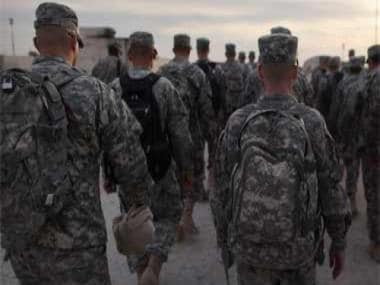The Pentagon on Friday said that it is pulling most U.S. troops out of Somalia on President Donald Trump’s orders, reports AP. The move is in continuation of Trump’s policy to reduce involvement of U.S. troops in counter-terrorism missions outside US soil.
Trump had recently ordered troops to be withdrawn from Afghanistan and Iraq with only a few thousand soldiers staying for the time being. Though Trump had declared that every soldier will be withdrawn from overseas missions, allies of the US in Europe, Asia, including members of NATO had cautioned against complete withdrawal. The U.S. military continues to maintain presence in neighboring Djibouti on the Bab al-Mandab Strait in order to counter the terrorists.
In line with this policy, the US was expected to withdraw some troops from Somalia. The Pentagon in a short statement said that “a majority” of U.S. troops and assets in Somalia will be withdrawn in early 2021. AP reports that there are currently about 700 troops in Somalia, training and advising local forces in their fight against the Islamic terror group al-Shabaab, an affiliate of al-Qaeda.
Joe Biden, who has opposed complete withdrawal of troops, could reverse Trump’s policy on overseas US troops or make some adjustments as per the counter-terrorism priorities of his administration. Biden had criticised Trump’s order to withdraw troops from Syria last year and maintained that the US needs to have as many troops as required to fight terrorists and as a deterrence to any forces trying to target the US.
The Pentagon said the drawdown in Somalia does not mark the end of U.S. counterterrorism efforts there. “As a result of this decision, some forces may be reassigned outside of East Africa,” it said. “However, the remaining forces will be repositioned from Somalia into neighboring countries in order to allow cross-border operations by both U.S. and partner forces to maintain pressure against violent extremist organizations operating in Somalia.”

Somalian President Mohamed Abdullahi Mohamed in October 2020, had opposed the troop withdrawal and urged the US to reconsider in view of the continued threat from al-Shabaab and IS inspired groups. “The United States military support to Somalia has enabled us to effectively combat Al-Shabaab and secure the Horn of Africa. A victory through this journey and for Somali-US partnership can only be achieved through continuous security partnership and capacity building support”, he wrote on twitter.
Speaking to AP, Somali national security specialist Samira Gaid said “… it’s disastrous for Somalia’s security sector, it just causes that first panic reaction: You know, why now?”Conveying the importance of the US presence, she says”Especially since over the past three and half years in particular the security sector really improved, and we tried to work closely with the U.S”, she told AP.
While counter-terrorism is sure to be affected, the troop pull-out will also have an impact on the internal security and political stability in the country as anti-government forces can regain control, opines Gaid.
Similarly, some experts have warned that a US withdrawal could embolden militants in the Horn of Africa region. Although the military operations by US, EU and other forces are weakening al-Shabab, the group is still able to carry out suicide attacks and has regained control of some towns in Somalia.
Experts believe that further troop pull-out would weaken the battle against the terror group as the Somalian army is not fully equipped and trained to take on the terrorists.
Major Terror attacks by Al-Shabaab
Al-Shabab emerged as the radical youth wing of Somalia’s now-defunct Union of Islamic Courts, which controlled Mogadishu in 2006. It is banned as a terrorist group by both the US and the UK and is believed to have between 7,000 and 9,000 fighters. Al-Shabab advocates the Saudi-inspired Wahhabi version of Islam.
Al-Shabab has been held responsible by Somalia’s government for the killing of at least 500 people in a huge truck bombing in the capital Mogadishu in October 2017. It was East Africa’s deadliest bombing.
It had claimed responsibility for the massive attack on a Kenyan military base in Somalia’s el-Ade town in January 2016, killing about 180 soldiers. In January 2020, the group attacked a US military base in Kenya and killed three US soldiers.
It has also staged several attacks in Kenya, including the 2015 massacre at Kenya’s Garissa University, near the border with Somalia. A total of 148 people died when gunmen stormed the university at dawn and targeted Christian students.
In 2013, al-Shabab terrorists attacked the Westgate shopping mall in Nairobi, resulting in a siege which left at least 67 people dead.
During the 2010 football World Cup final between Spain and the Netherlands, it bombed a rugby club and a restaurant in Uganda’s capital Kampala, killing 74 people watching the match.
